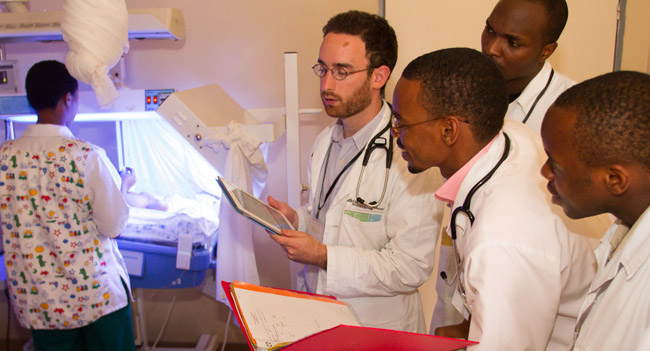
King Faisal Hospital in Kigali, Rwanda, is one of three tertiary referral hospitals in Rwanda. As the most advanced and well-equipped of them, King Faisal handles most of the referrals for sub-specialties like neuro-surgery. The hospital's work also involves cases that require mechanical ventilation or where there is concern for potential respiratory failure, explains Dr. Dorey Glenn, who currently works in the pediatric department at King Faisal as a faculty member with the Human Resources for Health program.
But as a semi-private institution, King Faisal also gets business from the wealthier part of Rwanda's population of about 11 million, including those who have opted for the more expensive of the country's two public insurance plans. They're not necessarily complicated cases, says Dr. Glenn. “Actually, they're often routine cases like viral colds that would have been handled as outpatient in the United States.”
“Unfortunately,” continues Dr. Glenn, “they still get admitted, because that's an expectation of medical treatment here.” There is also an expectation of antibiotics, he says, and often unneeded. “I really try to push the residents and the medical students to be specific when they're presenting on rounds: What are you treating? How do you know? Why did you start the antibiotics? Why did you choose that antibiotic? You see a lot of blank faces and shrugging of the shoulders. What's needed – like with so many other changes here in Rwanda – is for the models, the pediatricians and the senior residents, to set an example of how to think about patients, how to think about diagnosis, to be selective in their approach to treatment and not just put everybody on an antibiotic.”
Instituting that kind of change is a slow process, and Dr. Glenn says that trying to make improvements often results in frustration and hitting brick walls. But it has been remarkable to see how motivated the hospital and the physicians can be when they're pushed, he says. “Most things here are accomplished through pressure. People will declare it outright: 'if you want things done, put pressure.'”
An outside audit of the hospital in connection with a regional re-accreditation has been providing some much-needed pressure lately, and Dr. Glenn has seized the opportunity to move things along.
“Part of the accreditation involved chart audits, and it was found that many of our charts were incomplete. People would forget to sign their names, fail to fill in the date and time, or omit the initial assessment form – basic stuff. So, we created a simple checklist. Now, if the nurse finds a problem with the chart, a little quarter page sheet gets clipped to the front of it indicating what is missing and where, allowing the team in turn to quickly and easily fill in any missing parts.”
Dr. Glenn describes another simple quality improvement project he has initiated: “When I first started at King Faisal, people were frustrated: while on rounds, they would order a test, write the order, fill out the lab slip. But then, one of two things would often happen: either the nurse would fail to obtain the test, or she'd get it off to the lab just fine and the results would come back, but then people would forget they ever ordered that test, and nobody would look at the results for weeks, if ever. A complete waste of time and money. So, we designed a really simple form: when ordering a test, you now write your name, the date and the time. When the nurse sends the order off to the lab, she signs her name, and, finally, when someone sees the result, they sign their name, too, completing the sequence. This gives us a very simple way to track test results, and people thought it was a great idea.”
The key, says Dr. Glenn, has been finding out what they really need his help with and what motivates people to buy into the changes he's trying to institute. “Because if they're not motivated,” he says, “nothing will happen.”
